What next for politics in Israel as government falls?
- Published
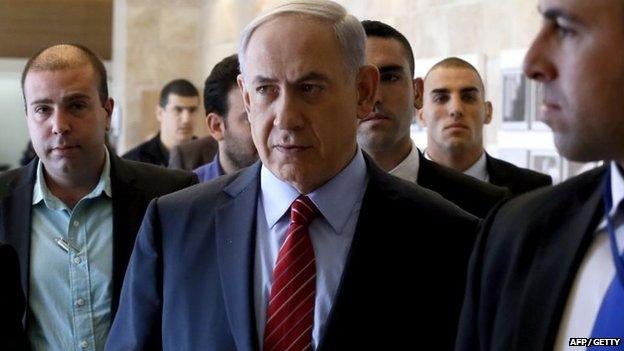
Mr Netanyahu is the second longest-serving prime minister in Israeli history
Israel's coalition government struggled to come up with coherent policies to a series of challenges in its short turbulent life but it did live up to one expectation at least - it did not last very long.
Key figures in the cabinet openly disagreed about how to fight the summer war in Gaza and, while the government did manage to nominate a minister to talk to the Palestinians, it never agreed on what to say to them.
The events of the last few dramatic days in Jerusalem have given Israeli voters a much clearer insight into what the last two years of government must have been like - fractious, dysfunctional and ridden with mutual suspicion.
Prime Minister Benjamin Netanyahu says senior ministers like Yair Lapid (Finance) and Tzipi Livni (Justice) were plotting to get rid of him, undermining his policies and ignoring his instructions.
They paint a picture of a prime minister presiding without much style over a chaotic collapse.
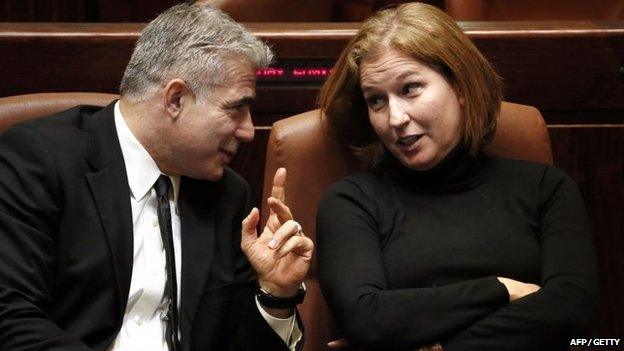
Yair Lapid (left) and Tzipi Livni both said they were sacked without warning
Mr Lapid is reported to have described how he ordered a coffee as the minister of finance and discovered before it was served that he had become leader of the opposition.
Ms Livni says she spent 45 minutes at a public event with Mr Netanyahu who did not speak to her throughout the proceedings but then phoned to fire her as soon as he got back in his car.
But this is not the story of an ideological meeting of minds that went wrong.
It is about a marriage of convenience that simply became inconvenient.
Household name
After the last elections in 2013, Benjamin Netanyahu found himself for the third time in a position to form a coalition government and faced a choice.
Alongside one obvious partner - Avigdor Lieberman's Yisrael Beitenu party which ran a combined list of candidates with Mr Netanyahu's Likud - he had various options to take him over the threshold for a parliamentary majority.
He could work with the small religious parties that represent ultra-Orthodox Jews or he could opt for a more secular coalition with a slightly centrist feel to it.
In the end he chose the second option.
That meant adding in Tzipi Livni, a former foreign minister who is relatively dovish on the Palestinian issue, and Yair Lapid, a household name as a TV presenter whose first run at parliament at the head of his own newly created party (Yesh Atid) had left him in a powerful position.
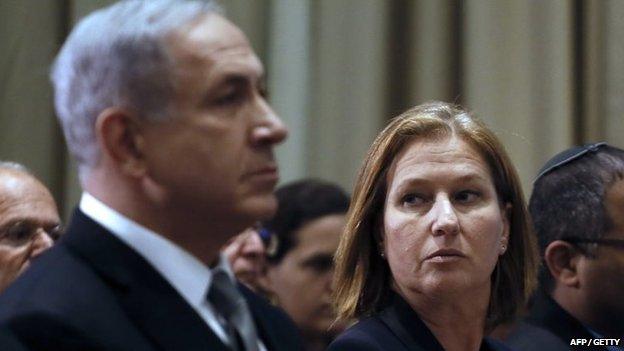
Ms Livni reportedly accused the prime minister of cowardice in his sacking of her
Neither is a natural ideological bedfellow of Mr Netanyahu and so the contradictions that brought down the coalition were there from the start.
None of this is a shock in the world of Israeli politics - the current coalition government is the 33rd to be created in the 66 years since the foundation of the state.
You do not need the powerful graphics computer of an election night TV programme to tell you that two years is around the average life of a coalition arrangement.
At least one poll has suggested that most Israelis are not convinced that it was really necessary to dissolve parliament and the influential newspaper Haaretz has described the coming elections as superfluous.
Tricky negotiations
But the idea of a government proving transitory is not a shock here.
Mr Netanyahu is obviously gambling that by going to the country now he will put himself in a position to form a new coalition that would prove a little more durable.
He's already the second longest-serving prime minister in Israeli history.
In the, admittedly unlikely, event that the next parliament served out the whole of its five year term he would rival the founding premier, David Ben-Gurion, as the longest.

Former minister Moshe Kahlo could be the surprise package of the 2015 election
His likeliest course of action would almost certainly be to bring back the ultra-Orthodox parties alongside Mr Bennett and then hope to add a couple of smaller parties by offering them attractive ministries or adopting one or two of their pet policies.
You can see why there is speculation that the next round of coalition negotiations might be even trickier than usual.
But the Israeli political landscape is crowded and unpredictable.
Before the last election in 2013 it was regarded as almost certain that Mr Netanyahu would emerge in a position to build a new coalition.
In 2015 that still seems likelier than any other outcome but it also seems much less certain.
One unpredictable factor is the transience of some Israeli political parties - described here as "mood" or '"flavour of the month" parties.
Unpredictable
The sharpest recent example is the centrist Kadima movement which was the leading faction in a government as recently as 2009 but has only two members in the current Knesset and could easily disappear altogether from the next.
Mr Lapid's Yesh Atid party came literally from nowhere in the last election to take some Kadima votes and form a substantial parliamentary presence.
It may well shrink dramatically in 2015 as another wild card party led by the former minister Moshe Kahlon prepares to enter the contest.
He is a former minister from Mr Netanyahu's Likud Party who made himself popular by cutting Israel's ruinous mobile phone prices when he opened up the cellular market in his time as minister of communications.
He is reportedly building a new party and may provide the shock of the new this time as Mr Lapid did the last time.
His presence helps to make things unpredictable as does a new technical measure - the threshold for a party to enter the Knesset has gone up from 2% to 3.25% making the pollsters' predictions even trickier than usual.
There is a lot to watch.
The parties representing Israel's Arab minority may band into a single list this time and thus increase their influence - although they will remain part of the political process rather than part of the decision-making process.
Israeli politics is never boring. But however this works out the next prime minister will face the same problems that so troubled the last one - the economy, the Palestinian issue and the choppy diplomatic waters of the Middle East.
Some things never change.
- Published2 December 2014
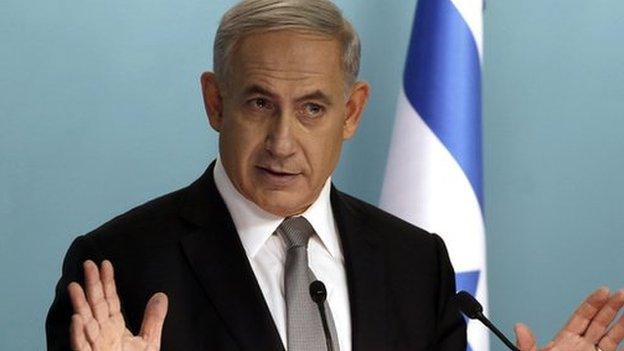
- Published21 November 2024

- Published15 March 2013
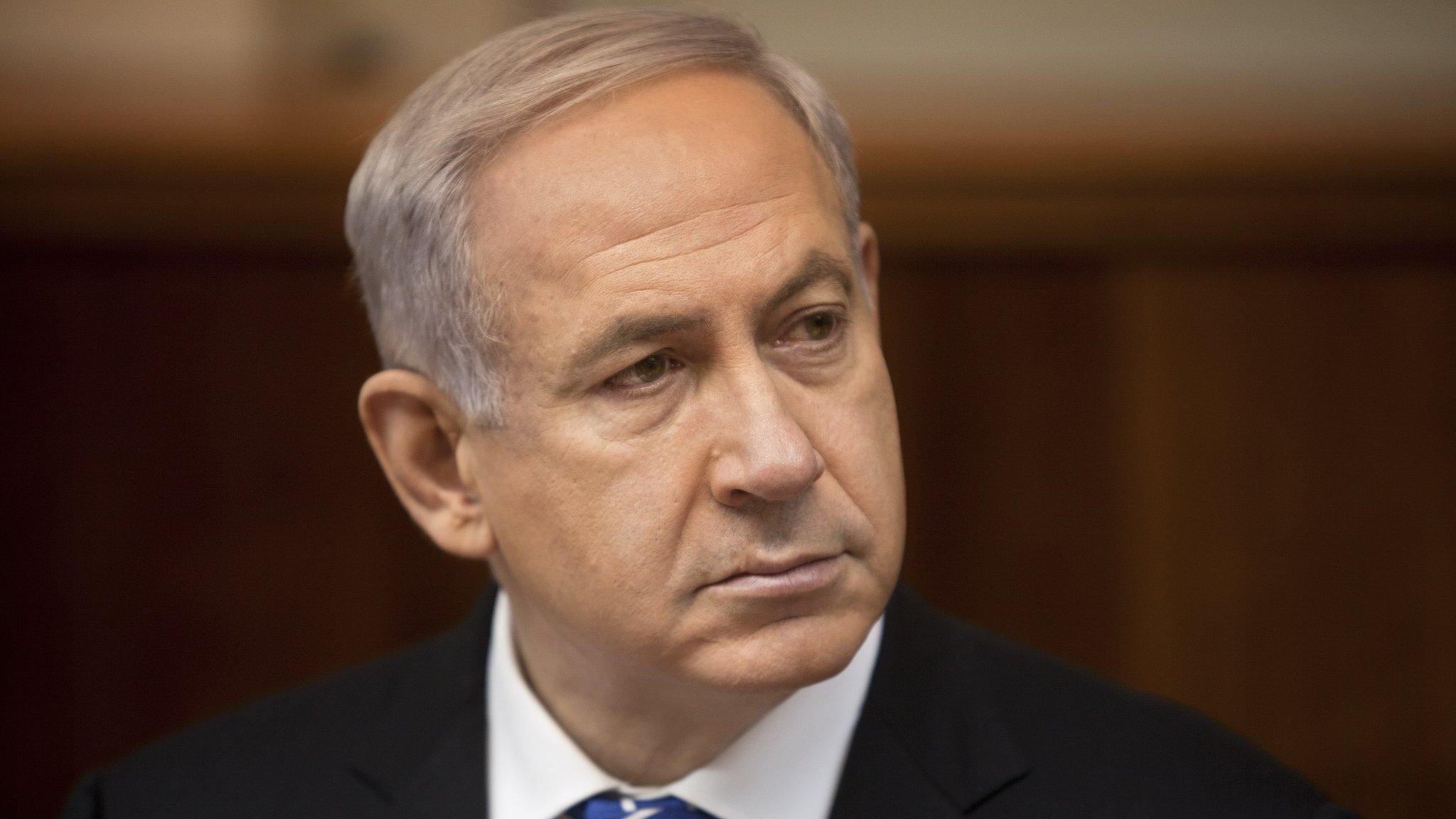
- Published22 January 2013

- Published27 November 2014
